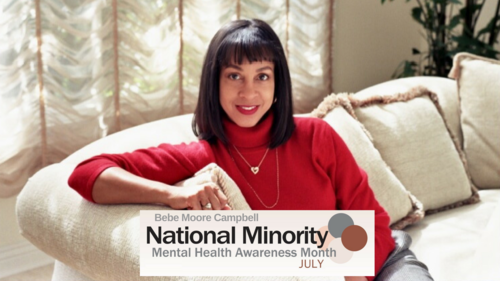Recognizing Bebe Moore Campbell National Minority Mental Health Awareness Month
In 2008, Congress passed a resolution that established the month of July as Bebe Moore Campbell National Minority Mental Health Awareness Month. This month highlights the following aims:
- To improve access to mental health treatment and services.
- To address the need for improved access to care, treatment, and services for those diagnosed with severe and persistent mental health disorders.
- To enhance public awareness of mental illness and mental illness among minorities.

www.namicaadvocacy.org/bebemoore
Moore Campbell (1950-2006) was a New York Times bestselling author and a strong advocate for mental health. Her tireless efforts to bring public awareness to minority mental health stemmed from her personal experiences with a family member. She recognized the unique challenges minorities face in addressing stigma and in accessing needed care and treatments. She was one of the founding members of the National Alliance on Mental Illness Urban Los Angeles. Established by African-American women supporting each another through seemingly insurmountable circumstances, this NAMI affiliate was one of the first created with a primary mission of addressing the needs of communities of color – communities that are all too often overlooked and underserved.
Two of Moore Campbell’s published works, Sometimes My Mommy Gets Angry, a children’s book, and 72 Hour Hold, a novel, tackle the emotions and experiences of relating to and coping with bipolar disorder. In her interviews, she described mental illness as a form of slavery and once said: “We won't always have to hide and run and do our work in the dark. The day is coming when people with brain diseases won't be written off or warehoused, when everyone will know that recovery is possible."
July offers us an opportunity to shed light on mental illness among racial and ethnic minorities. The disparities that persist for these groups are well-established. Storytelling is a vital component to eliminating disparities and improving the lives of those who have been disenfranchised by social factors.
Stories are told. Overcoming stigma takes courage and tireless advocacy for oneself and others. Facing mental health disorders can be especially difficult for individuals when seeking treatment conflicts with their cultural values or cultural identity. Strength Over Silence: Stories of Courage, Culture and Community is a three-part docuseries that explores mental health from the perspective of African-American and Latino communities. Through the retelling of their lived experiences, these advocates share their stories of resilience and recovery.
Stories are heard. Historically, the health care system has at times dismissed, overlooked or misdiagnosed individuals from certain racial and ethnic minority groups. Effective treatments should not only be tailored to the individual, but also be culturally informed to best serve groups made vulnerable by injustices. Think Cultural Health features information, continuing education and resources for health care professionals to learn about culturally and linguistically appropriate services (CLAS). This program is sponsored by the U.S. Department of Health and Human Services Office of Minority Health.
Stories are shared. Mental health awareness requires both outreach and support. Outreach should include efforts to give voice to those who are unable to speak for themselves and those who have been silenced. Storytelling at its core is a shared experience; shared in the sense that it builds a connection and also shared in the sense that these experiences are common and universal. The Brother, You’re on My Mind toolkit provides materials to educate Omega Psi Phi fraternity brothers and their community partners on the effects of depression and stress on black men. It was developed by the National Institute on Minority Health and Health Disparities.
By Steven Starks, M.D.
APA Assembly Representative for the Black Psychiatrists Caucus
References
- House Concurrent Resolution 134. Expressing the sense of the Congress that there should be established a Bebe Moore Campbell National Minority Mental Health Awareness Month to enhance public awareness of mental illness, especially within minority communities, 110th Congress, 2007-2008. https://www.congress.gov/bill/110th-congress/house-concurrent-resolution/134
- NPR Interview (July 2005) - Ed Gordon Talks with author Bebe Moore Campbell; Mental Illness in the African-American Community https://www.npr.org/templates/story/story.php?storyId=4729725
- Being On '72 Hour Hold' CBS News (August 2005) https://www.cbsnews.com/news/being-on-72-hour-hold/
- Dreifus, C. (2005, June 28). A conversation with: Bebe Moore Campbell; from the family album; a portrait of pain is drawn with care. The New York Times, p. F2. https://www.nytimes.com/2005/06/28/health/psychology/a-portrait-of-pain-is-drawn-with-care.html
- Institute of Medicine. 2003. Unequal Treatment: Confronting Racial and Ethnic Disparities in Health Care. Washington, DC: The National Academies Press. https://doi.org/10.17226/10260.
